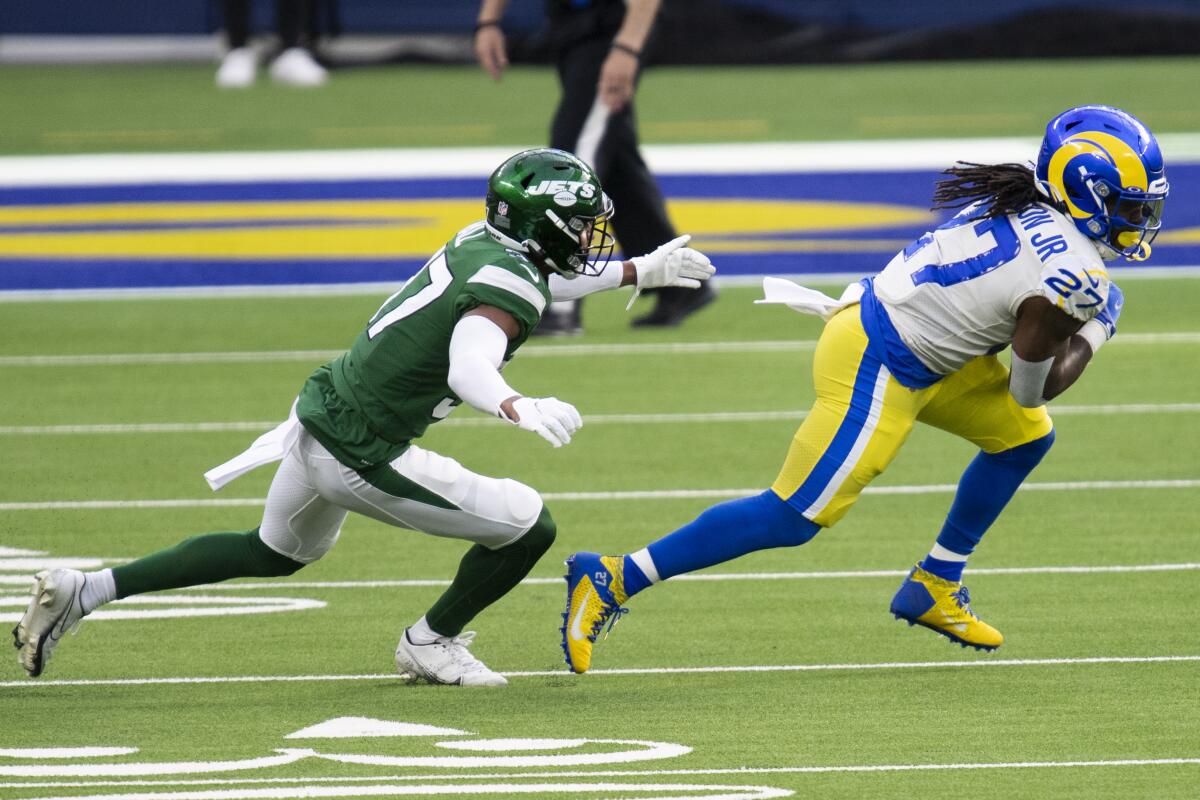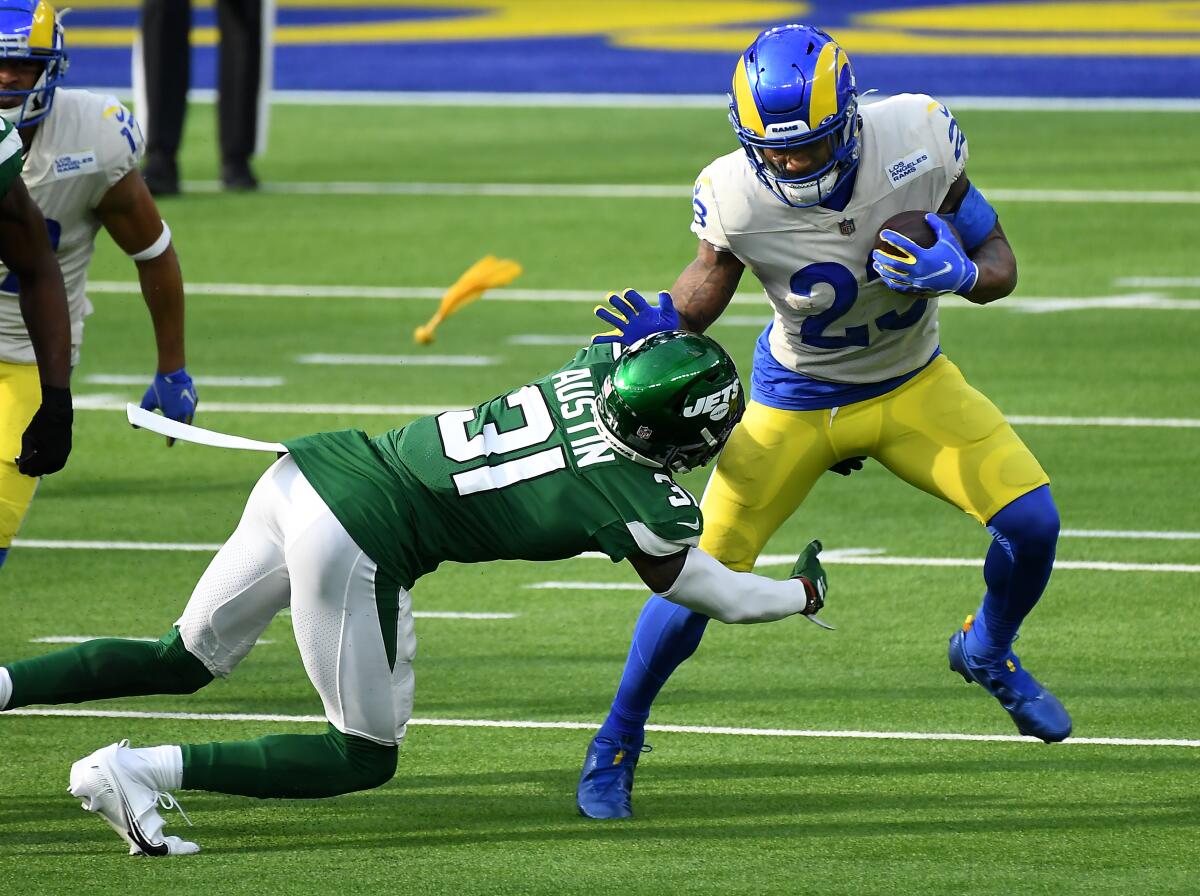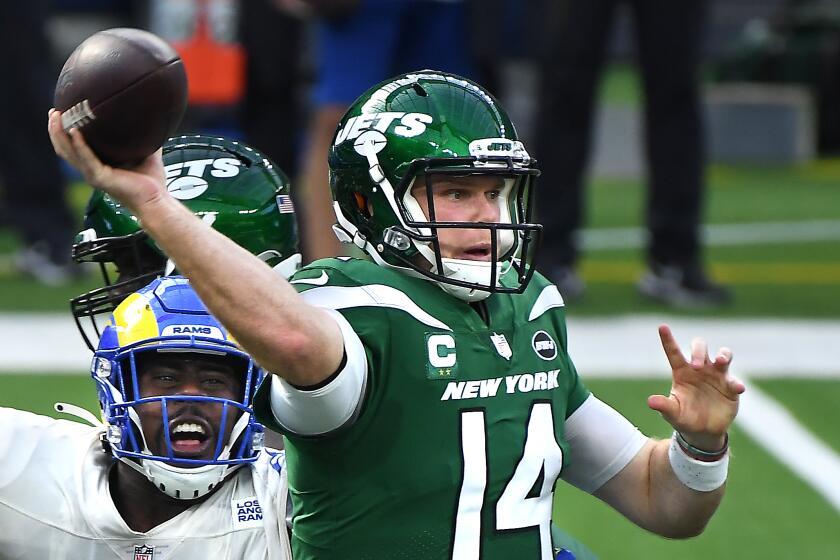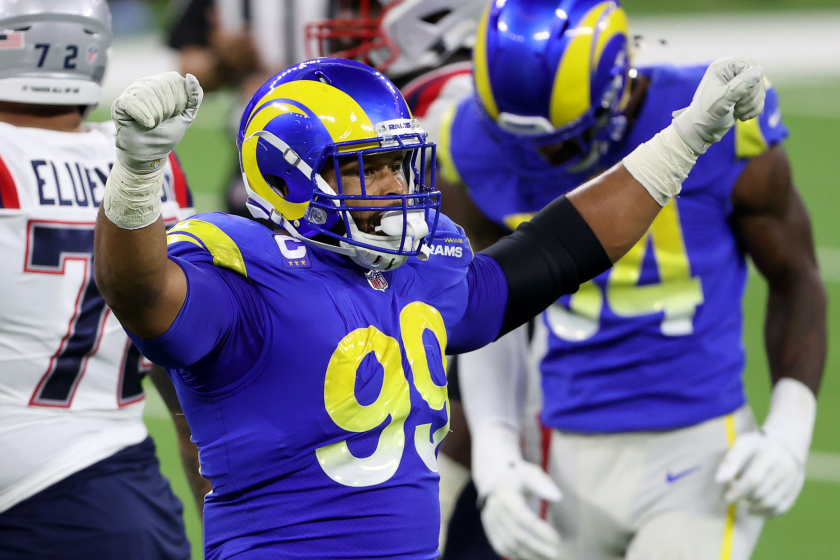Rams’ running-back-by-committee plan has produced Jekyll and Hyde results

- Share via
In four seasons with the Rams, coach Sean McVay has often drawn praise for an offense that features exotic motions, change-of-pace tempo and creative passing-route combinations.
But as the postseason nears, it’s clear the Rams should stay committed to a simple strategy: Run the football, early and often.
In their last two games, the Rams laid bare what can happen when the team produces Jekyll and Hyde performances.
In a 24-3 blowout victory over the New England Patriots, the Rams rushed 13 times for 99 yards in the first half. In the first two quarters of their 23-20 loss to the previously winless New York Jets, the Rams rushed for only 26 yards in eight carries.
“It was a lot of things we weren’t doing, and that’s uncharacteristic of how we want to play,” offensive lineman Rob Havenstein said after the loss Sunday. “We’re going to learn from it and move on.”
Much of McVay’s offense hinges on the success of the run, which enables quarterback Jared Goff to execute play-action fakes, bootlegs and rollouts. In six of the Rams’ nine victories, they ran the ball at least 30 times.
Rams coach Sean McVay’s words of encouragement to Jets coach Adam Gase prove a bit prophetic, but what does the future beyond 2020 hold for both teams?
After relying on since-released running back Todd Gurley for five seasons, the Rams began this season with a running-back-by-committee approach. Rookie Cam Akers has rushed for a team-best 591 yards, second-year pro Darrell Henderson has 562 yards and veteran Malcolm Brown 372 yards. But Akers suffered a high-ankle sprain against the Jets and will not play Sunday against the Seattle Seahawks at Lumen Field.
Receiver Robert Woods has rushed for 154 yards and two touchdowns in 22 carries on jet-sweep reverses. Receivers Cooper Kupp and Van Jefferson and tight ends Gerald Everett and Tyler Higbee also have carried the ball on running plays. The Rams average 127.9 yards rushing per game, which ranks ninth in the NFL. They are tied for third in the league with 19 rushing touchdowns.
“Part of our jobs as coaches is making sure you’re utilizing all the pieces that you do have,” McVay said. “The more guys that can contribute, the more we can activate and the more multiple and versatile we can be.
“It allows you to feel like you can stay in alignment with what you want to do offensively from a philosophical standpoint.”
The Rams have struggled when they failed to consistently run in the first half. On Oct. 18 against the San Francisco 49ers, nine first-half rushing plays netted 60 yards — 10 of which came on a Goff scramble. The Rams lost, 24-16, at Levi’s Stadium. Six weeks later at SoFi Stadium, the Rams rushed for only 37 yards in the first half against the 49ers. They lost, 23-20.
A similar pattern happened against the Jets, a game in which the Rams failed to convert any of their seven third-down plays in the first half and two of four in the second.

“When we run the football well, that’s usually reflective of moving the ball well,” McVay said. “When you don’t, usually you’re not efficient on third down. I think it all goes hand in hand. How poor we were on third down [against the Jets] … was a big reflection of the lack of continuity and success we were able to have.”
Lacking offensive balance has hurt the Rams at times, too. Akers, Brown and Henderson rushed for 122 yards in 27 carries in a 28-17 loss to the Miami Dolphins. But turnovers and special-teams lapses created an early deficit, and Goff attempted a season-high 61 passes.
Before the collapse to the Jets, the Rams controlled the line of scrimmage for two consecutive games, twice rushing more than 30 times for 119 yards and 186 yards against the Arizona Cardinals and Patriots, respectively.
In those games, they predominantly featured two tight-end sets — what is known as 12 personnel — using Higbee and Everett on the line of scrimmage or in the backfield. McVay used the grouping on 59% of the snaps, according to Next Gen Stats.
The extra blocking, coupled with the receiving threat, leaves defenses guessing, which the Rams exploited. Using 12 personnel on nearly 70% of the snaps against the Patriots enabled Akers to rush for a career-high 171 yards.
There’s no Pro Bowl because of COVID-19, but that hasn’t stopped the Rams’ Aaron Donald and Jalen Ramsey from earning Pro Bowl selections.
“We just have great tight ends that can block, and we want them in the game,” offensive lineman Joe Noteboom said. “We want to be able to utilize what we have, so just trying to get that run game going more and keep consistent drives going.”
On Sunday, the Rams can clinch a playoff spot and regain first place in the NFC West with a victory over the Seahawks.
The run-first formula could be effective.
In the Rams’ 23-16 victory over the Seahawks on Nov. 15, they rushed for 65 yards and two touchdowns in 13 first-half carries. They finished with 106 yards rushing in 29 carries. Goff passed for 302 yards.
“Anytime you throw for 300 and run for 100, it’s usually a pretty good outcome,” Goff said.
More to Read
Go beyond the scoreboard
Get the latest on L.A.'s teams in the daily Sports Report newsletter.
You may occasionally receive promotional content from the Los Angeles Times.









